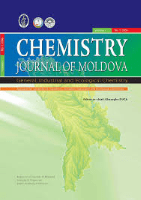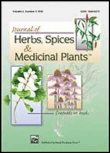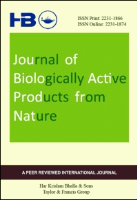
CHEMISTRY OF NATURAL COMPOUNDS
Scope & Guideline
Harnessing Nature’s Potential through Chemical Insights
Introduction
Aims and Scopes
- Natural Product Chemistry:
The core focus is the study of chemical compounds derived from plants, fungi, bacteria, and other natural sources, highlighting their structures, synthesis, and characterization. - Biological Activity Assessment:
Research often includes the evaluation of biological activities of natural compounds, such as antimicrobial, antioxidant, anti-inflammatory, and anticancer effects, establishing their potential therapeutic applications. - Phytochemistry and Ethnopharmacology:
The journal covers studies that explore the traditional uses of plants in medicine, integrating phytochemical analysis with ethnopharmacological insights. - Synthetic Methods Development:
There is a strong emphasis on developing novel synthetic methodologies for producing complex natural products or their derivatives, often with enhanced biological activities. - Environmental and Ecological Chemistry:
Papers may also address the ecological implications of natural compounds, including their roles in plant defense mechanisms and their interactions within ecosystems.
Trending and Emerging
- Endophytic and Microbial Natural Products:
There is a notable increase in studies exploring natural products derived from endophytic fungi and bacteria, emphasizing their unique metabolites with potential pharmaceutical applications. - Bioactivity-Driven Research:
A growing emphasis on the biological activities of natural products, particularly in relation to drug discovery, is evident. This includes a focus on compounds with antiviral, anticancer, and anti-inflammatory properties. - Sustainable Extraction and Green Chemistry:
Research that prioritizes sustainable extraction methods and environmentally friendly synthetic approaches is gaining traction, aligning with global sustainability goals. - Metabolomic Approaches:
The integration of metabolomics in studying natural products is emerging, allowing for comprehensive profiling of metabolites and their biological implications, thus enhancing understanding of complex natural mixtures. - Nanotechnology and Natural Products:
The application of nanotechnology in enhancing the delivery and efficacy of natural products is a rising theme, reflecting advancements in drug formulation and therapeutic strategies.
Declining or Waning
- Traditional Medicinal Applications:
Research explicitly focused on traditional uses of natural products in herbal medicine appears to be decreasing, possibly due to a shift towards more mechanistic studies and clinical applications. - Simple Compound Analysis:
The publication of studies involving basic identification and characterization of single compounds without extensive biological evaluation is less frequent, reflecting a trend towards more comprehensive studies that include biological and ecological assessments. - Invasive Species Studies:
Research focusing on the chemistry of invasive plant species has become less common, possibly as attention shifts to conservation and sustainable use of native species.
Similar Journals

JOURNAL OF HETEROCYCLIC CHEMISTRY
Illuminating the Path of Heterocyclic DiscoveriesJournal of Heterocyclic Chemistry, published by Wiley, stands as a key resource in the field of organic chemistry, offering in-depth research articles and insights spanning from 1966 to 2024. With its strong Scopus ranking of #83 out of 211 in the Organic Chemistry category, placing it in the 60th percentile, the journal maintains its significance and relevance within the academic community. Although it does not currently offer open access options, it provides extensive coverage of heterocyclic compounds, which are vital to various applications in pharmaceuticals and material sciences. The journal's commitment to high-quality research is further reflected in its classification as Q3 in the 2023 quartiles for Organic Chemistry. Researchers, professionals, and students alike will find valuable contributions to the intricate studies of heterocycles, enhancing their understanding and exploration of this fascinating area of chemistry.

Chemistry Journal of Moldova
Connecting Ideas: Where Chemistry Meets Practical SolutionsChemistry Journal of Moldova is a pioneering open-access journal dedicated to fostering the dissemination of significant research in the diverse fields of chemistry, including Environmental Chemistry, Process Chemistry and Technology, and more. Published by the esteemed Academia Sciences Moldova, Institute of Chemistry, this journal has been at the forefront of scientific inquiry since its establishment in 2006. With an ISSN of 1857-1727 and a digital presence through its E-ISSN of 2345-1688, it provides an accessible platform for researchers, students, and professionals to share and engage with cutting-edge findings. Although currently ranked in the Q4 quartile in several chemistry categories, the journal is committed to improving its impact within the academic community and aims to highlight emerging trends and technologies in the chemistry domain. The journal's office is located at 3 Academiei Str, Chisinau MD-2028, Moldova. As it converges its publication years from 2016 to 2024, the Chemistry Journal of Moldova invites all contributors and readers to explore its rich repository of research that bridges innovative ideas to practical applications.

Boletin Latinoamericano y del Caribe de Plantas Medicinales y Aromaticas
Illuminating Traditional Wisdom and Modern ApplicationsBoletin Latinoamericano y del Caribe de Plantas Medicinales y Aromaticas, published by MS-EDITIONS, serves as a vital platform for the dissemination of research and insights related to medicinal and aromatic plants in Latin America and the Caribbean. With its ISSN 0717-7917, this journal operates within multiple scientific categories, achieving notable rankings, including Q3 in Complementary and Alternative Medicine and Q4 in Drug Discovery, Pharmacology, and Plant Science for 2023. The journal is committed to providing a space for high-quality research that supports the exploration of traditional and innovative uses of plant resources in health and wellness. Researchers, professionals, and students are encouraged to contribute their findings from 2008 through 2024, fostering a rich collaborative environment that advances knowledge in this essential field. Though not officially listed as open access, Boletin Latinoamericano y del Caribe de Plantas Medicinales y Aromaticas remains a critical resource for those invested in the science of plant-based therapies and their implications in modern medicine.

Indian Journal of Natural Products and Resources
Transforming Challenges into Opportunities in AgricultureIndian Journal of Natural Products and Resources, published by NATL INST SCIENCE COMMUNICATION & INFORMATION RESOURCES-NISCAIR, serves as a vibrant platform for researchers and professionals engaged in the fields of agronomy, crop science, food science, and plant science. Established in 2006 and embracing an open-access model since 2009, this journal is dedicated to disseminating innovative research and fostering collaboration among scholars in India and beyond. With a focus on the sustainable use and management of natural products and resources, it aims to explore topics that address contemporary challenges in agriculture and food security. As of 2023, the journal holds a Q4 ranking in its respective categories and is indexed in Scopus, albeit with an emphasis on enhancing its visibility and citation impact. By providing an accessible venue for high-quality research, the Indian Journal of Natural Products and Resources plays a crucial role in contributing to the scientific discourse and promoting advancements in sustainable practices in the natural resources sector.

INDIAN JOURNAL OF CHEMISTRY
Exploring the Depths of Chemical Science with Rigorous StandardsINDIAN JOURNAL OF CHEMISTRY, published by the NATL INST SCIENCE COMMUNICATION & POLICY RESEARCH (NIScPR), stands as a vital platform for disseminating innovative research and advancements in the fields of organic, inorganic, and physical chemistry. With its inception in 1969, this journal has served the global community of chemists and researchers, contributing significantly to the advancement of chemical sciences in India and beyond. The journal maintains a strong commitment to open access, facilitating widespread dissemination of knowledge, allowing readers from diverse backgrounds to access cutting-edge research without barriers. Although coverage in Scopus has been temporarily discontinued, the journal continues to uphold rigorous scholarly standards, making it an authoritative source for academicians, professionals, and students alike. Readers can expect high-quality articles that reflect the latest developments and discoveries in chemistry, reinforcing the journal's reputation as an essential resource in the scientific community.

RUSSIAN JOURNAL OF BIOORGANIC CHEMISTRY
Fostering Collaboration in Life Sciences ResearchRussian Journal of Bioorganic Chemistry (ISSN: 1068-1620, E-ISSN: 1608-330X), published by MAIK Nauka/Interperiodica/Springer, serves as a vital resource for researchers and professionals in the fields of bioorganic chemistry, biochemistry, and organic chemistry. With a focus on the integration of organic chemistry principles with biological processes, this journal aims to disseminate significant findings and advancements from both theoretical and practical perspectives. Although currently not open access, the journal retains a dedication to high-quality, peer-reviewed content, contributing to its reputation within the academic community. The 2023 Scopus rankings position it within the Q4 category for both biochemistry and organic chemistry, indicating its critical niche within these disciplines amid a competitive landscape. Since its inception in 1996, the journal has continued to evolve, providing enriching insights and fostering collaborations among scholars and practitioners alike, with publication converging up to the year 2024. By exploring complex biomolecular interactions and the synthesis of biologically relevant compounds, the Russian Journal of Bioorganic Chemistry remains a significant platform for advancing knowledge and innovation in the life sciences.

European Journal of Medicinal Chemistry Reports
Connecting research to practice in drug development.European Journal of Medicinal Chemistry Reports, published by ELSEVIER, is a vital platform dedicated to advancing the field of medicinal chemistry through open access communication of high-quality research. With an impact factor reflecting its growing influence, this journal has rapidly established a reputation for scholarly excellence since its launch in 2021. It serves as a converging point for innovative studies and reviews that span the disciplines of chemistry and molecular medicine, reflected in its Q2 and Q3 quartile rankings in relevant categories for 2023. Situated in France, the journal is accessible globally, ensuring that researchers, professionals, and students can easily engage with significant findings and methodologies in medicinal chemistry. The open access model facilitates the dissemination of knowledge, bridging gaps between laboratory research and practical applications in drug development. By fostering collaboration and highlighting emerging trends, the European Journal of Medicinal Chemistry Reports plays a crucial role in shaping the future of therapeutic innovations.

Natural Products and Bioprospecting
Pioneering the Future of Natural Product ApplicationsNatural Products and Bioprospecting is a prestigious academic journal published by SPRINGERNATURE, dedicated to advancing research in the fields of analytical chemistry, biochemistry, plant science, organic chemistry, and pharmacology. With an impact factor that positions it within the top quartiles across multiple categories, this journal serves as a crucial platform for disseminating groundbreaking findings and innovative methodologies focusing on the potential of natural products. Since adopting its Open Access model in 2011, it has broadened its reach, allowing global accessibility to cutting-edge research. The journal, based in Singapore, aims to foster interdisciplinary collaboration and encourages submissions that explore the intricate relationships between natural products and their applications in food science, toxicology, and pharmacology. Its well-respected status is further highlighted by impressive Scopus ranks and a growing H-index, reinforcing its significance in the scientific community. Researchers, professionals, and students alike can benefit from the rich repository of knowledge that Natural Products and Bioprospecting continuously curates and disseminates, making it an invaluable resource in the quest for innovative solutions derived from nature.

JOURNAL OF HERBS SPICES AND MEDICINAL PLANTS
Harnessing the Potential of Plant-Based TherapiesJOURNAL OF HERBS SPICES AND MEDICINAL PLANTS, published by Taylor & Francis Ltd, serves as a pivotal platform for researchers and professionals in the fields of Complementary and Alternative Medicine and Pharmacology. With an ISSN of 1049-6475 and E-ISSN of 1540-3580, this journal is dedicated to advancing the understanding of the therapeutic potential of herbs, spices, and various medicinal plants, and showcases high-quality, peer-reviewed research from 1992 to 2024. As of 2023, it holds a respectable Q3 ranking in both relevant categories, exhibiting its growing influence within the academic community. The journal is not open access, yet it remains a vital resource for those exploring the diverse applications and efficacy of plant-based therapies. Researchers and students alike will benefit from the journal’s commitment to disseminating innovative findings that can enhance the quality of life through natural remedies, thereby contributing significantly to the global discourse on herbal medicine.

Journal of Biologically Active Products from Nature
Innovating Through Nature's Biologically Active TreasuresJournal of Biologically Active Products from Nature, published by Taylor & Francis Ltd, is a pioneering, peer-reviewed journal dedicated to the exploration and dissemination of knowledge regarding biologically active compounds derived from natural sources. With an ISSN of 2231-1866 and an E-ISSN of 2231-1874, this journal has established itself as a crucial resource within the fields of Agricultural and Biological Sciences, Complementary and Alternative Medicine, Pharmacology, Plant Science, and Toxicology, offering valuable insights that cater to a diverse readership including researchers, professionals, and students. Since its inception in 2011, it has contributed significantly to scientific discourse and innovation, as evidenced by its ranking in various Scopus categories, such as the 55th percentile in Complementary and Alternative Medicine. Even though it currently does not offer open access, this journal remains an invaluable asset for those seeking to stay at the forefront of natural product research and its applications in healthcare and agriculture. The journal's commitment to high-quality publication reflects its aim to enhance the scientific understanding of nutraceuticals and their relevance in modern medicine.